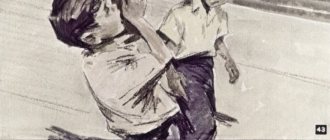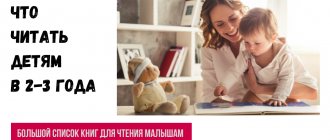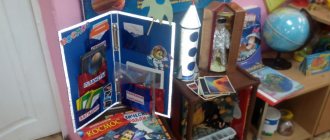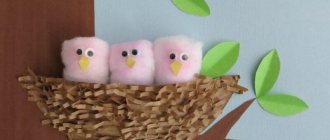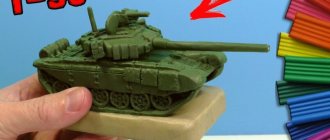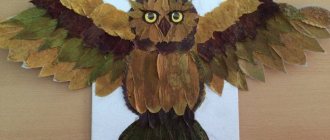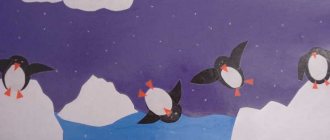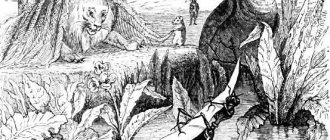WHO SHOULD GO FOR FIREWOOD?
On the edge of the village lived a widow with three sons. The two sons are already grown-up boys, tall, stately, nice, and handsome. And the third - teenager Yura - small, thin, like a reed. It was winter. Deep snow fell, the north wind blew, and the frost crackled. The mother says, as if to herself, but so that the children can hear: “It’s cold, children.” But there is no firewood... Who should go for firewood?
The eldest sons are silent, their heads bent, they look at the ground and are hacking away at the stove. “I’ll go get firewood, mom,” said the youngest son. – Aren’t you afraid of frost? - the mother asks and glances at her older sons. “No, I’m not afraid,” the son answers and gets dressed. “Well, go, Yura,” said the mother, tightly belted him and kissed her son. Yura went. And immediately it became so quiet in the house, as if every living thing in the world was listening and thinking: what will happen? And the wind in the yard died down. The two eldest sons raised their heads, looked at their mother and said: “We will also go into the forest, mother.” “Go, sons,” the mother whispered and cried with joy.
V. Sukhomlinsky
Boris Zakhoder "Little Rusachok"
From the series “Fairy Tales for People”
A little bunny named Rusachok is friends with Tadpole. One day Little Mermaid, as usual, runs to the shore of the pond to play with a friend, but instead sees an unfamiliar Frog. The little frog explained to his friend that this is how nature works: a worm turns into a mosquito, an egg into a fish, and a tadpole into a frog.
Arriving home, Little Rusachok begins to find out from his mother when he will “transform.” He doesn’t want to turn into a “big, beautiful hare,” as his mother promises him. And he decides: “I’ll look at everyone who lives in the forest: whoever I like the most, I’ll become one!” Here is the Capercaillie - large, beautiful, but somewhat deaf, almost caught by the hunters. Here is a dexterous Squirrel, but to become a squirrel, you need to learn to climb trees, and this is “not a hare’s business.” But here is the beautiful Fox, but she’s cynical and bloodthirsty: “Whoever I catch, I’ll crush, and whoever I crush, I’ll eat!” No, Rusachok didn’t want to become a fox either: “It’s not our business to offend others!” And the hare saw disadvantages in other animals, because of which he did not want to turn into them. And this is true - you need to value your individuality and accept yourself as nature created you. Or God. It's who believes what.
In the preface to this fairy tale cycle, Boris Zakhoder writes: “These tales are told by the animals themselves, and they are told to people. To all people - both adults and children... And they hope that when people get to know them better, they will become kinder to them.” So the educational moment in these tales is inseparable from the educational one. And this fairy tale is generally perceived as very topical.
3.
What a delicious soup
In one multi-colored city there lived a small, or rather, already quite large boy. He was more than four, but less than seven years old, and his name was very simple. How is still a secret. This boy was very good - cheerful, inquisitive, smart, and of course, always obeyed his mother. For example, now, when his mother told him: “Son, eat the soup!” He shook his head and turned away from the spoon. How? He always obeyed his mother! But sometimes he obeyed “the other way around.” The soup was so ordinary, but I wanted something unusual - sweets, cookies, a sausage sandwich. But my mother stubbornly brought the spoon with the soup to her mouth. - Let's go for mom, for dad! Open your mouth! You're already a big boy, eat some soup! The boy stubbornly shook his head and clenched his teeth more and more tightly so that not a drop of soup would get into his mouth. - Dad will come home from work and eat soup! Everyone should eat soup! And if you don’t eat it, I’ll actually give it to the neighbor boy. Then mom decided to use a trick. - Look, a hippopotamus is flying outside the window! The boy opened his mouth in surprise and turned to the window. True, he had never seen hippos, but suddenly he was really flying there. Mom brought the spoon with soup to her mouth faster than lightning, but the boy, not seeing the hippopotamus, managed to close his mouth in front of the spoon. And success was very close! Then mom got a call from work, and she went out into the hallway. The boy saw that the cat came into the kitchen and began to eat his food with appetite. On the street, pigeons were pecking at bread crumbs, and the girl was biting off a fragrant loaf, for which she was sent to the store. In fact, he really wanted to eat and he looked into the plate. The potatoes and carrots were cut into even cubes, the noodles were thin and well-cooked, and there wasn’t a single black peppercorn in the plate, which the boy couldn’t stand. He sighed and picked up the spoon. It was actually very tasty! The soup just melted in your mouth and was just right. And here is a crust of white bread to go with it. Mom returned three minutes later, with a sigh she picked up the spoon again, but there was no more soup in the plate. -Where is the soup? - she was surprised. “I don’t know, the neighbor’s boy probably ate it,” the boy winked at her. So what was the boy's name? And his name was (insert your child’s name). And in general, a fairy tale can be about a girl. Just replace a few words.
ABOUT GREED
Once upon a time there lived a boy, Sasha Luzhaikin. Sasha was a good boy, but greedy. He never shared treats with his friends and didn’t let them play with his toys. “Here’s another idea - to give someone a treat!” – Sasha was angry to himself. – And why is this necessary? They treat each other, smile and laugh at the same time. What kind of joy? It’s much nicer: you took it yourself and ate it yourself. You'll get more for yourself. But then one day something incredible happened. Mom and dad went to a concert. Grandmother sat down in a chair and began to knit, but quickly dozed off. And at this time it began to rain heavily. And suddenly Sasha saw some small strange creature outside the window, getting wet from the rain. Sasha's curiosity awoke and he opened the window. The creature ended up in the boy's room. - Who are you? – asked Sasha. - I am Veselinka, and who are you? - And I'm Sasha. - Do you have a friend? – the guest asked. “No,” said Sasha. “Everyone says that I’m greedy, and that’s why I don’t have a friend.” “You’re not greedy at all,” said Veselinka. “Such a nice boy can’t be greedy.” I know that the greedy are the wolf and the fox. They will never share their prey with anyone. Sasha thought about it. He was interested in Veselinka. She was bright and cheerful. She could become a good friend. In the evening, Sasha put a handful of sweets in his trouser pocket. He decided to treat the guys tomorrow. It’s not his time to be greedy!
The treat was accepted with joy. The children thanked Sasha, and only one boy, Dima Kopeikin, asked:
- What happened to you? Why did you suddenly become so generous? - First of all, I made a friend. And secondly, I'm tired of being greedy. Dima said: “We want to meet your new friend.” In the evening, a noisy company ended up visiting Sasha. Everyone liked Veselinka, because she had a kind, cheerful disposition. - She will teach you a lot of good things! - the guys exclaimed. – Because she looks at the world from a kind, sunny side!
Questions and tasks for the fairy tale
How did Sasha's greed manifest itself? Did Sasha have a friend? How did Vasilinka end up in Sasha’s house? For what reason did the guys come to Sasha’s house? Draw how you see Veselinka. What proverbs fit the fairy tale? Whoever you hang out with, that's how you'll gain. Greed is the beginning of all vices. The main meaning of the fairy tale is that next to a good, cheerful person, another person becomes better. Next to a cheerful person you feel like the sun. And as for greed... How to prevent a child from becoming greedy? From early childhood, accustom him to reasonable generosity, organize everything so that he has the opportunity to share with someone.
“The Cat and the Fox”, arranged by Vladimir Ivanovich Dahl
A fairy tale with such a plot and characters is in the collection of Russian folk tales by Alexander Nikolaevich Afanasyev. But Vladimir Ivanovich Dahl’s version is no less interesting.
The owner threw the cat out of the house, who grew old and stopped catching mice, but began to carry the owner's sour cream and cottage cheese (a reason to discuss the problem of cruelty to animals with the child). The fox invites him into her hole with the secret intention of using him to scare the forest inhabitants and increase her authority. At a general meeting, the fox announces that a new “burgist” (manager) has appeared in the forest, who kicked him out of the hole and ordered everyone to bring tribute - a gift. The frightened animals unquestioningly carry out the order: “the wolf brought a quarter of veal, the bear made beer and honey, the ferret plucked and cleaned the duck, and the ferret brought him a couple of eggs...” And when the animals saw the cat with their own eyes - with eyes glowing in the darkness of the hole - they got scared and “cleaned it.” the whole forest where the fox lived with his steward.” And the fox began to hunt freely.
Vladimir Dal published the collection “Russian Fairy Tales” in 1832, being at that time a military doctor, doctor of medicine. For his collection of fairy tales, he was awarded the title of Doctor of Philology and invited to teach at Dorpat (now Tartu) University, from which he had previously graduated - but that’s another story. Dahl's Russian Fairy Tales were a huge success among his contemporaries. It was not a shame to give such a book to Pushkin himself, who in response presented Dahl with a handwritten version of “The Tale of the Priest and His Worker Balda.” And today the fairy tale “The Cat and the Fox” in Dahl’s adaptation pleases with its rich, flowery, truly folk language, witty dialogues (its heroes do not mince words), and humor. Listening to it, the child will get an idea of how they spoke in the 19th century, compare it with modern Russian speech and enrich their vocabulary. The fairy tale is satirical, and a five-year-old child already understands that it is impossible to deceive and the fox did the wrong thing by surviving with the help of the cat of the forest inhabitants.
2.
THEY DON'T SCRUTTEN FOR THE TRUTH
It was New Year's Eve. The tree had been decorated for a long time and now sparkled cheerfully with lights, as if winking. Masha and Vitya played next to her and dreamed out loud about what Grandfather Frost would give them. They really expected that he would give them exactly what they wanted: Masha - a doll, Vitya - a car, well, not a real one, of course, but one that could be used to carry toys and sand in the summer at the dacha. Masha asked Vitya: “What do you think, maybe Santa Claus has already put gifts under the Christmas tree for us, but we haven’t noticed? What is he going to wait for tonight? Vitya shrugged his shoulders, saying, I don’t know. Then they decided to look under the tree, suddenly, however, a doll and a car were already waiting for them. They tried so hard, pushing apart the branches of the Christmas tree, that they did not notice how the toy fell to the floor and broke. Dad was in the next room and didn't hear anything. “Well, what should we do now? – Vitya asked. “It was your idea to climb under the tree, and you will be responsible for the broken toy.” “Well, no, they broke it together, we will answer together, and you, as the eldest, will generally get it from your parents,” his sister stuck her tongue out at him. “Let’s throw away the toy as if nothing had happened,” Vitya suggested. His sister supported his idea. They carefully collected all the pieces and threw them in the trash.
Valentin Kataev. "The pipe and the jug"
Sometimes magic items turn out to be useless. For example, the magic pipe from this story can show all the berries in the forest, but if there is no basket, then there will be nowhere to put them. What is acquired without difficulty brings no benefit. The author's parable by Valentin Kataev has the depth of a folk tale.
4.
A true friend
It was spring. The sun was shining very brightly, the snow had almost melted. And Misha was really looking forward to summer. In June he turned twelve years old, and his parents promised to give him a new bicycle for his birthday, which he had long dreamed of. He already had one, but Misha, as he himself liked to say, “grew out of it a long time ago.” He did well in school, and his mom and dad, and sometimes his grandparents, would give him money as praise for his excellent behavior or good grades. Misha did not spend this money, he saved it. He had a big piggy bank where he put all the money that was given to him. Since the beginning of the school year, he had accumulated a significant amount, and the boy wanted to offer his parents this money so that they could buy him a bicycle before his birthday, he really wanted to ride. Misha had a best friend. His name was Pashka. They sat with him at the same desk and were, as the teachers said, “in the water.” Pashka was the headman in their class. For the May holidays, their class teacher, Natalya Grigorievna, suggested that the whole class go to the circus, and entrusted the head boy with collecting the money for tickets. Pasha was a diligent boy: he not only wrote down who gave money for tickets, but also carefully put all the money in a bag, and then hid it in his backpack so as not to lose it.
And so, when there was nothing left before the holidays, Pashka lost this package. He remembered very well how he put it in his backpack, and then ran with the boys to play football at the school stadium, and the backpack remained in the locker room. He shook out the entire contents of his backpack onto the floor and went through every piece of paper in every notebook, hoping to see a bag of money there, but there was no sign of any bag. - They probably stole it! - said Pashka. “No, most likely you just dropped it somewhere,” Misha suggested. - I’ll get a kick out of both the guys and the class! Well, what to do now? Maybe we’ll put out an advertisement, like, well, a package of money is lost... After all, what a sum...
- Who will believe you, if they found him, then they probably took him for themselves. Misha thought for a minute, then loudly slapped himself on the forehead: “How could I not have guessed it right away!” “Wait for me here, I’ll be there soon,” he shouted to Pashka already at the door. Half an hour later, Misha returned with his piggy bank, poured its contents onto the bench: “How much do you need?” Pasha counted out the required amount and returned the rest to Misha. “Mish, you know...I always knew that you were a true friend...I have nothing more to say,” Pashka gave Misha a smile. “What did you save for?” - he added. “It doesn’t matter anymore,” the friend answered with slight sadness. In the evening, my mother noticed that the piggy bank was almost empty. She called Misha into the room. — I couldn’t resist, I spent it, right? - Spent it. - And for what? - Yes, you see, mom, Pashka, as our headman, was supposed to collect money for the circus, he collected it, and then lost it, so I gave it to him. - Are you sure you lost it? - Exactly! Pashka would never deceive me, I know that for sure. - Well, okay, I gave it, so I gave it. In general, you know, Mish, you acted like a true friend. “That’s what Pashka said.” - Well, that means it is so! The next morning Misha woke up from some strange sound. He opened his eyes and saw his dad leaning on the handlebars of his shiny new bicycle and ringing the bell. - Dad, did you buy me a bike?! But my birthday is still more than a month away. And I didn’t deserve it, I took the money and gave it away. - Just deserved it! Why wait until summer, the snow has almost melted. Run to Pashka and call him to ride quickly.
Tamara Mikheeva. "Once upon a time there were pencils"
An amazingly beautiful, poetic and at the same time educational tale about colors. It is reminiscent of Yuri Koval’s fairy tale “Red Beard”, in which the colors are also personified - blue, red, yellow - and in a fairy-tale playful form it is shown how, when mixed, these basic colors form different shades.
But Tamara Mikheeva conducts her excursion into the technology of producing many different colors in a lyrical way that is unique to her. The heroes of her story - red, blue and yellow pencils - discover more and more new friends while working together on drawings. Blue and Yellow decide to paint the sea and the beach, but they are in a hurry, and where the sea mixes with sand, a new color appears - a “joyful and bright” green color. Then purple and orange colors appear...
It's good when the colors are in harmony with each other. But even if they are contrasting, this is not a reason to quarrel! And completely different creatures, if they treat each other with respect, can create something beautiful together. For example, a beautiful green field with red poppies. But at first, the red color reacted very coldly and arrogantly to the green color’s timid proposal to be friends: “Actually, you’re not right for me at all. You are completely different, not even one of my shades.”
This is how an educational fairy tale unobtrusively teaches important laws of communication. From the fairy tale, the child learns that, in addition to the primary colors, there are many more shades. There are at least a dozen shades of green listed here, with such beautiful names: pistachio, apple, olive, lime, herbal, malachite, fern! Even gray, it turns out, is not boring at all. It comes in beautiful shades like silver, steel, pearl gray and even a shade called pink ash!
In her fairy tale, Tamara Mikheeva introduces a child to the color spectrum and at the same time talks about serious things: camaraderie, mutual assistance, the ability to respect and get along with those who are not like you. And also about gratitude. When the pencils, which faithfully served their little master, were completely worn out, he did not throw them away, but carefully put them in a box and left them as a souvenir. And when he grew up, he became an artist. It was a nice story, informative and kind.
Candies
Lisa really enjoyed studying in 1st grade. She liked her classmates and teacher. Still, she had one reason why she was reluctant to go to school. This reason was her desk neighbor Kolya Solntsev. Every time Lisa came home from school, she found a whole mountain of candy wrappers in her briefcase. She knew for sure that Kolya was putting candy wrappers in her backpack, because she once caught him doing this. Lisa reprimanded him, but he just laughed, and the next day she again found candy wrappers in her backpack. Lisa shared her troubles with her mother. Mom smiled, hugged her daughter, and whispered something in her ear.
Grandfather and boy
Today Misha's second lesson is Russian. This is his favorite subject at school. Therefore, he is already sitting at his desk, without waiting for the call. During the lesson, we were asked to write an essay on the topic: “What do I want to become when I grow up?” Misha thought quite a bit; just yesterday in a bookstore he saw a book about astronauts. Now it was his dream to fly into space. He wrote the essay the fastest and received an “A”. He flew home as if on wings. “Why are you so cheerful?” - Mom asked. “I got an A for my essay! Mom, I decided to become an astronaut!” “What kind of astronaut are you if you are constantly sick? No, don’t even dream!” - Mom snapped sternly. Misha had tears in his eyes, but he didn’t answer; he was used to trusting his mother’s authority. Then he approached his dad: “Dad, do you think I can become an astronaut?” “Mish, go ask your mom, I’m working, I don’t have time. And in general, to become an astronaut, you need to study well, but you’re bad at math,” Dad didn’t add optimism. He was always busy, and Misha didn’t even really count on the fact that his dad would help him decide on his future profession.
Having nothing better to do, Misha went out into the yard. Grandfather was sitting on the bench. He lived in the next entrance. Misha often saw him on the street, always said hello, but never talked to him. Misha sat down on a bench next to his grandfather and began to draw something in the sand with a stick. "What are you drawing?" — the old man asked. “Yes, nothing…” the boy sighed sadly. "Why are you sad?" - the grandfather did not let up. “Yes, today at school they wrote an essay about what I would like to be when I grow up, I wrote that I want to fly into space, but my mother is against it, but I think you still have to fight for your dream, try, study well, don’t be lazy , toughen up, and then I will definitely become an astronaut. What do you think, grandfather, what will I be when I become as big as dad?” – Misha asked his grandfather. "I think you'll be Human!" - Grandfather said, getting up. “Strange,” thought Misha. “Am I not a man?”
good
Yurik woke up in the morning. I looked out the window. The sun is shining. It's a good day. And the boy wanted to do something good himself. So he sits and thinks: “What if my little sister was drowning, and I would save her!” And my little sister was right there: “Walk with me, Yura!” - Go away, don’t bother me thinking! My little sister was offended and walked away. And Yura thinks: “If only wolves attacked the nanny, and I would shoot them!” And the nanny is right there: “Put away the dishes, Yurochka.” - Clean it yourself - I have no time! The nanny shook her head. And Yura thinks again: “If only Trezorka fell into the well, and I would pull him out!” And Trezorka is right there. His tail wags: “Give me a drink, Yura!” - Go away! Don't bother thinking! Trezorka closed his mouth and climbed into the bushes. And Yura went to his mother: “What could I do that’s so good?” Mom stroked Yura’s head: “Go for a walk with your little sister, help the nanny put away the dishes, give Trezor some water.”
Tannin achievements
Every evening, dad took a notebook and pencil and sat down with Tanya and grandmother. - Well, what are your achievements? - he asked. Dad explained to Tanya that achievements are all the good and useful things a person has done in a day. Dad carefully wrote down Tanya's achievements in a notebook. One day he asked, holding a pencil at the ready as usual: “Well, what are your achievements?” “Tanya was washing the dishes and broke a cup,” said the grandmother. “Hm…” said the father. - Dad! - Tanya begged. - The cup was bad, it fell on its own! There is no need to write about it in our achievements! Just write: Tanya washed the dishes! - Fine! - Dad laughed. - Let's punish this cup so that next time, when washing dishes, the other one will be more careful!
Sonya Danowski. "Grandfather's Garden"
Lina's grandfather is a skilled gardener who dotes on his lupines and dahlias. One day he ends up in the hospital and asks his granddaughter to water the plants in the greenhouse. Lina’s little dog digs an underground passage under the greenhouse, and at night voracious snails crawl into it... How can I tell my grandfather that his wonderful garden is no more? Maybe I should lie or remain silent? A difficult dilemma that Lina will have to solve.
10.
Yes, there is such a medicine!
Baba Mani’s hut is a former bathhouse, the only building in the village that survived the war, with a vegetable garden the size of a volleyball court, and there are only one birch tree, and even that disabled World War II one, like stumps, raised a dry fork to the sky, chopped off by a shell . But the bird people love and adore Baba Manina’s estate. Loud bully sparrows thrive on it from morning to night, white-sided magpies swing on the birch as easily as on a swing, crows and pigeons celebrate their weddings. Whose first song in the spring is the beautiful starling? At Baba Mani's. On the disabled birch tree, to which she attached a simple, hastily knocked together birdhouse on the day when she and her fellow countrymen emerged from the partisan forests. The neighbors were amazed by this. They have starling houses - mansions carved on poles. And with all the comforts: here you have a little entrance with clever doors, here you have a shelf and a birch branch - sit wherever you want and sing your songs. But starlings do not rush into these towers. In the spring, all day long they fight for Manina’s ruined women, and only after the final division does some loser take up residence in the towers. “Baba Manya,” the neighbors asked, “tell us your bird word with which you lure the starlings to you.” - What is my bird word? I don't know any bird words. Sometimes, out of boredom, you go out and talk to them. That's all my bird's word. That spring, Grandma Manya decided to renovate her birdhouse a little, and what the hell, the birdhouses would get angry and fly away to the neighbors. Every creature of God loves to take care of itself. On a warm sunny day, she left the house, trod a path in the snow to the disabled birch tree, then brought a ladder and placed it against the tree trunk. Grandma Manya was old and decrepit. She somehow climbed up the first three crossbars, and then, feeling dizzy, she fell into the snow. For some time she lay unconscious in the snow, and then the sparrows flocked to the birch tree and let everyone shout in a crowd: “Get up, get up, Baba Manya!” Otherwise you'll catch a cold. Baba Manya stood up. She got up, made it home with difficulty, and fell ill: she developed bilateral pneumonia. Grandma Manya did not get out of bed for more than a month, and the doctors had no doubt: the old woman would die. There is no medicine in the world that can raise an old person from the dead. Yes, there is such a medicine! Starlings brought it to Baba Mana. One day, early in the morning, Grandma Manya came to her senses - and what was it? Who knocks on all the windows of her wretched shack? She lifted her old head from the pillow - and, my God: squawks! Her favorites. They knock, beat on the frames with their yellow beaks, beat on the glass with their blued wings: “Get up, get up, Baba Manya!” We brought you health. Baba Manya dropped her head on the pillow out of powerlessness and cried: “No, no, I can’t, guys.” I won’t be able to get up and meet you again. - Yes, how can you not meet me! Who said you don't have the strength? Baba Manya made an incredible effort and stood up. She could not die without looking at her beloved bird one last time. Grasping the walls and the doorposts with her hands, she crawled out into the warm sun, leaned on a light little batotok, white with age, like herself, and stood there for a long time with her eyes closed, listening with pleasure to the spring song of the starlings. From that day on, Baba Manya began to recover.
Didn't do anything
After lessons, Andrei and Nikita remained on duty in the classroom. Having finished cleaning, they said goodbye to teacher Kristina Vitalievna and ran out of the classroom. It was unusually quiet in the corridor - all the children had gone home. Only the cleaning lady, Katerina Vasilievna, was washing the floor. The guys, trying not to slip, quietly walked towards the stairs. A girl from a parallel class was walking up the steps towards them. She was carrying a whole stack of books in her hands, and did not see the bucket of water that stood near the mathematics classroom. Having tripped over a bucket, she could not resist and fell. Books scattered on the wet floor. - Oh, what a disaster! — the cleaning lady clasped her hands. - Baby, are you hurt?
“No,” the girl answered, wiping her tears, “but it’s a pity for the books - they’re all wet...” “The main thing is that you’re safe!” - Katerina Vasilievna smiled. - Let's dry the books! All this time the guys stood on the landing, watching what was happening from afar, and giggling. The cleaning lady noticed them and shamed them: “Oh, you!” - What about us?! We didn't do anything! — the boys answered in unison, shrugging their shoulders. - That’s exactly what it is: NOTHING!!! - Katerina Vasilievna answered them with a sad sigh.
Why are illustrations needed?
The main feature of children's attention is its involuntariness. It is difficult for a child to maintain attention on one object for a long time, even if it is a book with an interesting fairy tale. Using hearing alone is not enough in this case. In order for the child to remain focused, it is important to connect other types of perception - visual (pictures), and in some cases tactile (toy books, puzzle books, etc.).
When it comes to fairy tales for children 5 years old online, it is even more difficult to perceive the text on the monitor of an electronic device.
That is why on our website special attention is paid to drawings for children's books, and in this section you will find exceptionally high-quality illustrations.
Real knights
Sashka and Maksimka have been best friends since childhood. They lived in neighboring houses and went to school together. And even in the same class. One day, friends were returning from school, and on the way they were talking about who the knights were. Sashka, gesturing with his hands, enthusiastically talked about knightly tournaments and armor. Maksimka, dreamily scratching behind his ear, said: “Eh!” Those were the times! And now? There is no place to even show knightly qualities: courage, courage! Save whom?! Should we take the cats out of the trees? - Oh, at least cats! — Sashka nodded, agreeing. So, talking enthusiastically, they reached the playground. Continuing to think about what feats could be accomplished in our time, they sat down on a bench. Suddenly, they saw classmate Katya. Both Maximka and Sashka liked Katya very much. She was polite, modest and a good student. Katya had long hair, which was always neatly braided. Out of nowhere, their classmate, poor student Petka, ran up to Katya. He pulled the girl's braid hard. Katya cried. It is clear that she was hurt and offended. Sashka jumped up from the bench and chased after Petka. And Maksimka ran up to Katya and handed her a clean handkerchief so that she could wipe away her tears. “Thank you,” the girl smiled and took the handkerchief. - Don't be afraid of anyone! Sasha and I will always protect you from now on! - Maksimka said seriously. - Thank you! - Katya nodded. -You are real knights! Maksimka squinted his eyes cheerfully and smiled.
